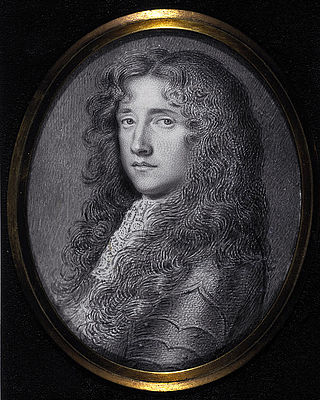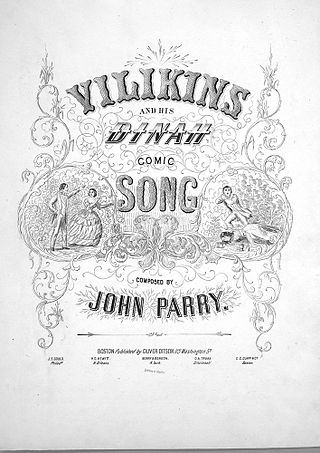"The Fields of Athenry" is a song written in 1979 by Pete St. John in the style of an Irish folk ballad. Set during the Great Famine of the 1840s, the lyrics feature a fictional man from near Athenry in County Galway, who stole food for his starving family and has been sentenced to transportation to the Australian penal colony at Botany Bay. It has become a widely known, popular anthem for Irish sports supporters.

Bonnie Dundee is the title of a poem and a song written by Walter Scott in 1825 in honour of John Graham, 7th Laird of Claverhouse, who was created 1st Viscount Dundee in November 1688, then in 1689 led a Jacobite rising in which he died, becoming a Jacobite hero.
"Star of the County Down" is an Irish ballad set near Banbridge in County Down, Ireland. The words are by Cathal MacGarvey (1866–1927) from Ramelton, County Donegal. MacGarvey's song was first collected in Herbert Hughes Irish Country Songs. The tune is traditional, and may be known as "Dives and Lazarus" or "Kingsfold".
Flowers of the Forest, or The Fluuers o the Forest, is a Scottish folk tune and work of war poetry commemorating the defeat of the Scottish army, and the death of James IV, at the Battle of Flodden in September 1513. Although the original words are unknown, the melody was recorded c. 1615–1625 in the John Skene of Halyards Manuscript as "Flowres of the Forrest", although it might have been composed earlier.
"She Moved Through the Fair", also called "She Moves Through the Fair", is a traditional Irish folk song, which exists in a number of versions and has been recorded many times. The narrator sees his lover move away from him through the fair, after telling him that since her family will approve, "it will not be long, love, till our wedding day". She returns as a ghost at night, and repeats the words "it will not be long, love, till our wedding day", intimating her own tragic death and the couple's potential reunion in the afterlife.
"The Bonnie Earl o' Moray" is a popular Scottish ballad, which may date from as early as the 17th century.

"The Three Ravens" is an English folk ballad, printed in the song book Melismata compiled by Thomas Ravenscroft and published in 1611, but it is perhaps older than that. Newer versions were recorded right up through the 19th century. Francis James Child recorded several versions in his Child Ballads.
"The Wearing of the Green" is an Irish street ballad lamenting the repression of supporters of the Irish Rebellion of 1798. It is to an old Irish air, and many versions of the lyric exist, the best-known being by Dion Boucicault. The song proclaims that "they are hanging men and women for the wearing of the green".
"The Parting Glass" is a Scottish traditional song, often sung at the end of a gathering of friends. It has also long been sung in Ireland, where it remains popular and has strongly influenced how it is often sung today. It was purportedly the most popular parting song sung in Scotland before Robert Burns wrote "Auld Lang Syne".
"Annie Laurie" is an old Scottish song based on a poem said to have been written by William Douglas of Dumfriesshire, about his romance with Annie Laurie (1682–1764). The words were modified and the tune was added by Alicia Scott in 1834/5. The song is also known as "Maxwelton Braes".
The Bonnie Lass o' Fyvie is a Scottish folk song about a thwarted romance between a soldier and a girl. Like many folk songs, the authorship is unattributed, there is no strict version of the lyrics, and it is often referred to by its opening line "There once was a troop o' Irish dragoons". The song is also known by a variety of other names, the most common of them being "Peggy-O", "Fennario", and "The Maid of Fife".
Bothy ballads are songs sung by farm labourers in the northeast region of Scotland.

"The Great Silkie of Sule Skerry" or "The Grey Selkie of Sule Skerry" is a traditional folk song from Orkney and Shetland. Sule skerry being a far flung island of the Orkney archipelago. A woman has her child taken away by its father, the great selkie of Sule Skerry which can transform from a seal into a human. The woman is fated to marry a gunner who will harpoon the selkie and their son.
"The Maid and the Palmer" is an English language medieval murder ballad with supernatural/religious overtones. Because of its dark and sinister lyrics, the song was often avoided by folk singers. Child's main text in English comes from the seventeenth century ballad collection compiled by Thomas Percy, supplemented by a nineteenth century fragment recalled by Sir Walter Scott, although both Child and later scholars agree that the English language version(s) of the ballad derive from an earlier Continental original or "Magdalene ballad" that is based upon a medieval legend associated with Mary Magdalene, in which her story has become conflated with that of the Samaritan woman at the well in the Gospel of John. The ballad was present in oral tradition in Scotland in the early years of the nineteenth century but was subsequently lost there, however versions have since been recovered in Ireland, in particular among the Irish Traveller community, with an intervening gap of some 150 years. A small fragment of the ballad has also been claimed to have been recovered in the US, but the veracity of this record is disputed. The "palmer" of Child's title, as included the Percy MS version, refers to a pilgrim, normally from Western Europe, who had visited the holy places in Palestine and who, as a token of his visits to the Holy Land, brought back a palm leaf or a palm leaf folded into a cross. In the ballad the palmer, as a holy man, has the ability to see the Magdalene character/protagonist's past in which she has borne and buried numerous children and to prescribe what fate awaits her in the hereafter, in the form of a set of seven year penances following which she will be absolved from her sins; in Continental versions, and in one variant collected in Ireland, the palmer is in fact Jesus.
Caledonia is a modern Scottish folk ballad written by Dougie MacLean in 1977. The chorus of the song features the lyric "Caledonia, you're calling me, and now I'm going home", the term "Caledonia" itself being a Latin word for Scotland. "Caledonia" has been covered by various artists, and is often dubbed Scotland's "unofficial national anthem".
"Wee Cooper O'Fife" is a Scottish folk song about a cooper who has "a braw new wife" who will not cook, clean, and sew in case she "spoil her comely hue". A town in Fife is called Cupar; this is a pun.

Celtic Folkweave is a studio album by Mick Hanly and Mícheál Ó Domhnaill, released in 1974 by Polydor Records. Considered a seminal album in the traditional Irish music genre, the musicians involved in the recording would go on to found some of the most innovative and important groups to perform traditional Irish music.

"Villikins and his Dinah" is a stage song which emerged in England in 1853 as a burlesque version of a traditional ballad called "William and Dinah". Its great popularity led to the tune being later adopted for many other songs, of which the best known today is "Sweet Betsy from Pike".
The Banks of Sweet Dundee is a folk song very popular with and frequently collected from traditional singers in Britain and Ireland, fairly common in North America, and also performed by revival singers and groups. A young woman escapes a forced marriage by shooting dead both the squire who is her intended husband and her uncle who attacks her.